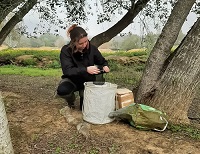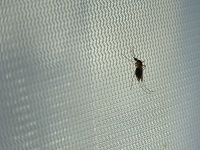Vector-transmitted pathogens significantly contribute to the global disease burden and are causing increasing concern due to global warming and land use changes worldwide. Among these pathogens, haemosporidian parasites are of particular interest as they are widespread, extremely diverse, and can be associated with health issues for humans, livestock, and wildlife.
To address these growing challenges, researchers and scientists worldwide have come together under the banner of the "Wildlife Malaria Network (WIMANET)," a new initiative funded by COST (European Cooperation in Science and Technology). This collaboration seeks to pool resources, expertise, and data from various research groups to tackle the challenges surrounding wildlife haemosporidian parasites on a global scale.
For decades, ornithologists, mammalogists, and herpetologists have studied haemosporidian parasites. These investigations have yielded valuable insights into host-parasite interactions, the geographic distribution of parasites and host-switching behaviors. Additionally, these studies have shed light on the pathogenic effects of haemosporidian infections and their implications for wildlife conservation. In recent years, researchers have expanded their focus to include the vectors of these parasites and have harnessed genetic techniques, for instance to unravel intricate details of parasite gene expression.
The Doñana Biological Station has a strong research group in this line. "WIMANET is essentiañ because it provides a global platform to address the challenges associated with malaria parasites in wildlife," comments Martina Ferraguti, one of the researchers who will participate in the initiative. "By bringing together scientists and experts from diverse disciplines and regions, WIMANET facilitates collaboration, fosters a comprehensive understanding of the host-vector-parasite system, and promotes awareness of the importance of these diseases."
By coordinating and sharing research efforts, WIMANET aims at facilitating large-scale collaborative research initiatives that transcend local and regional boundaries.The COST action WIMANET has the following key objectives:
1. Common Research Agenda: to encourage researchers to collaborate and exchange knowledge. By working together, the network hopes to address critical questions related to vector-borne parasites at a global level.
2. Interdisciplinary Collaboration: to foster an interdisciplinary approach by bringing experts from various fields together. These diverse collaborations are expected to yield a more comprehensive understanding of the host-vector-haemosporidian system.
3. Support for New Researchers: to attract and support researchers from diverse backgrounds, providing them with opportunities for training and collaboration. This inclusive approach aims to expand the network's expertise and strengthen its collective impact.
4. Engaging Stakeholders: to actively engage with stakeholders, policymakers, and the general public to facilitate knowledge transfer. By raising awareness about vector-borne parasites and their impact, the initiative seeks to garner support for its research endeavors.
By uniting researchers and institutions from around the world, WIMANET holds the promise of advancing our understanding of wildlife haemosporidian parasites and finding effective strategies to tackle the challenges we face with wildlife malaria parasites in a changing world.
For more information about WIMANET, please visit the COST Action CA22108 webpage (https://www.cost.eu/actions/CA22108/).


 La Estación Biológica de Doñana participa en la Wildlife Malaria Network (WIMANET)
La Estación Biológica de Doñana participa en la Wildlife Malaria Network (WIMANET)



